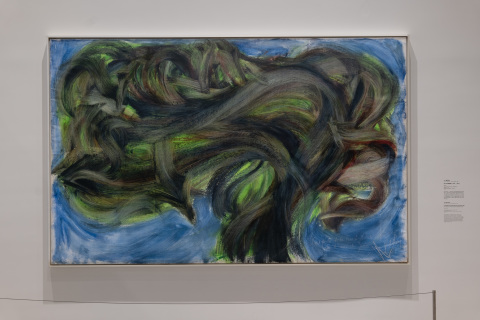<Vent>
Raised in a family of scholars in Nantong, Zao Wou-Ki moved to Paris in 1948 and turned to oil painting under the influence of Paul Klee. Having recently embraced abstraction, he created Vent Wind, inspired not by a specific landscape but by the movement of natural forces. At once real and intangible, a breath of wind gently disturbs the calm surface of the water. Emerging from the depths of the grey-brown, mysterious signs rise to the top of the canvas, rendered in black and white and reminiscent of traditional Chinese calligraphy and painting.

Centre Pompidou, Paris
Musée national d’art moderne - Centre de création industrielle
AM 1985-20
<Grande ocre tache jaune pâle>
From the 1960s onward, Olivier Debré developed his series of Signe-Paysages [Sign-Landscapes], beginning with rhythmic ink variations on paper. Grande ocre tache jaune pâle [Large Ochre, Pale Yellow Stain] is reminiscent of this series, unfolding across a fluid background with large, textured brushstrokes around the edges. Harmonious shades of yellow, orange, and black contrast with olive green, evoking the French landscapes of Touraine and the banks of the Loire—places to which the artist held a deep, personal connection.

Centre Pompidou, Paris
Musée national d’art moderne - Centre de création industrielle
AM 2002-314
<Bleu tache jaune (Grande bleue)>
Olivier Debré's abstract paintings reflect his psychological states when confronted with the spectacle of nature. In this nearly monochrome painting, a vast, fluid expanse of deep blue evokes the movement of water and foam. At the edge, Debré traces delicate white waves, while a thick impasto of yellow creates a striking contrast against the intensity of the blue. Inspired by the Atlantic as seen from Saint-Georges-de-Didonne in southwest France, the work's monumental format invites viewers to immerse themselves in the painting-ocean.

Centre Pompidou, Paris
Musée national d’art moderne - Centre de création industrielle
AM 2002-315
<Cercle Paysage>
Geneviève Asse, a proponent of pure abstraction, focused on the subtle chromatic variations of light in her paintings. Influenced by the 19th-century British painter Joseph Mallord William Turner, Asse drew inspiration from the landscapes of her native Brittany in France, distilling them into luminous vibrations. Cercle Paysage Circle Landscape stands out in her oeuvre – typically dominated by monochrome blue – as one of her rare works capturing the fluctuations of the sky. As the title suggests, the depiction of a reddish sun, partially veiled by mist, also serves as a subtle variation on the circle motif.

Musée national d’art moderne - Centre de création industrielle
Gift of the artist, 2012
AM 2013-228
<La Conquête de la Franche-Comté par le mois de juin>
The emergence of a burgeoning form rising from the nourishing earth, fills the picture plane. An underlying green hue accentuates its movement, contrasting with the surrounding blue. The circular brushstrokes are characteristic of the style developed by Jean Messagier in the mid-1950s. As for the title, it situates the work in the French region of Franche-Comté, where Messagier settled in 1962, while ironically alluding to a history painting commemorating the battles of King Louis XIV.

Centre Pompidou, Paris
Musée national d’art moderne - Centre de création industrielle
AM 2020-61
<Ce qui émane du paysage>
In both painting and sculpture, Jacques Brown created a syncretic oeuvre, freely mixing elements of mythological, religious and fantastic inspiration. In the almost square format that he particularly favoured, he applied the paint with varying degrees of fluidity, using vigorous gestures that were undoubtedly influenced by the CoBrA movement. This influence is evident in the numerous drips and splashes that mark the pictorial space, which is entirely dedicated to the artist’s intense subjectivity in response to the spectacle of nature.

Centre Pompidou, Paris
Musée national d’art moderne - Centre de création industrielle
AM 2024-779
<Les Correspondances>
In 1955, the French painter Frédéric Benrath began his major series Zones d'insécurité [Zones of Insecurity], to which this work belongs. In these mostly monochrome paintings, sometimes streaked by bright bursts of colour, he scratched vigorously with the tip of a knife into all or part of the surface while the paint was still wet. Les Correspondances [Correspondences] features a luminous, reddish swirl strewn with scratch marks, possibly representing a psychic state manifested in atmospheric form. Elements of nature seem to collide, materializing as clouds and violent winds.

Centre Pompidou, Paris
Musée national d’art moderne - Centre de création industrielle
AM 2019-742
<Le Lavandou>
In May 1952, Nicolas de Staël moved to the south of France, where he made studies on the beach at Le Lavandou, facing the sun at its zenith. Back in his Paris studio, he translated these impressions into works of vibrant, saturated colour. In this painting, with its unusual vertical format for a landscape, the motif of the bathers – positioned like an abstract sign – is firmly anchored in the brown sand. Reduced to raw forms, their silhouettes resist the dissolution of contours and the flattening of volumes, threatened by the voraciousness of the light.

Centre Pompidou, Paris
Musée national d’art moderne - Centre de création industrielle
AM 3634 P
<Untitled>
Inspired simultaneously by the shanshui paintings of Fan Kuan and Guo Xi from the Song dynasty (960-1279) and by American Abstract Expressionism, Chuang Che merges these two traditions. Dissolving oil paint in a large quantity of thinner, he applies it as if it were ink. This process makes the pigments as transparent as water and as hazy as mountain mist. Feelings of amplitude and movement permeate this landscape, in which calligraphic gestures embrace shimmering colour.

Centre Pompidou, Paris
Musée national d’art moderne - Centre de création industrielle
AM 2021-562